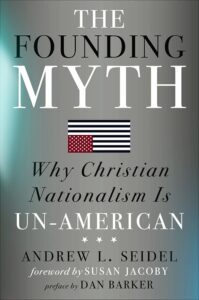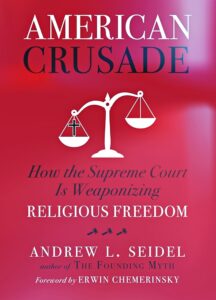Podcast: Play in new window | Download
Religious Nationalism and Separation of Church and State
The separation between church and state is a key component of our democracy, ensuring that freedom of belief is a right for all, not a privilege for some. The First Amendment’s establishment clause, “Congress shall make no law respecting an establishment of religion,” has been understood to prohibit the government from establishing an official religion or favoring one religion over others. This interpretation aims to ensure that the government remains neutral in religious matters and does not interfere with or support religious activities, thus maintaining a clear separation between religious institutions and government functions. Despite this, recent rulings by the right-leaning Supreme Court blur the lines between church and state and threaten to undermine this doctrine.
The rise of white Christian nationalism contributes to the degradation of the principle of separation of church and state. This movement reflects broader cultural and demographic trends and exerts significant influence on policy, public discourse, and grassroots movements. Addressing this issue involves understanding the underlying causes and promoting policies that uphold the constitutional commitment to religious neutrality and freedom.
Guest – Attorney Andrew Seidel, is the Vice President for Communications at Americans United for Separation of Church and State, an organization that challenges threats to the First Amendment. He is also the author of two acclaimed books: The Founding Myth: Why Christian Nationalism Is Un-American and American Crusade: How the Supreme Court is weaponizing Religious Freedom.
—-
Hamas’ brutal attack on Israel on October 7 and Israel’s deadly and sustained military assault on Gaza have had significant consequences in the United States affecting the presidential election and triggering protests and counter-protests at hundreds of college campuses across the country.
It has also presented a serious test for progressive Jews and progressive Jewish organizations in the United States. One of those organizations is Bend the Arc which describes itself as “building a multiracial, multi-ethnic, inter-generational movement of Jews and allies all across the country who are rising up to build an American future free from white supremacy, antisemitism, and racism.” The Bend the Arc family of organizations includes a C3, C4 and a PAC, and in the past, I served as national chair of Bend the Arc’s C3 board and am currently active in its work in the California Chapter.
Until now, Bend the Arc had a strong boundary around working only on domestic economic and racial justice issues. But that all changed on June 4. On that day, Jamie Beran, CEO of Bend the Arc , sent a letter to President Biden. The letter welcomed Biden’s support for a permanent ceasefire plan in Gaza, but quickly added that, “Time and time again, despite your calls to end this violence, you have not followed through with material action. With over one million Palestinian refugees now being forced to flee Rafah, their last guaranteed refuge, thousands of lives lost, and families of captives being fined in Israel for demanding a ceasefire, it is long past time to end U.S. support for these attacks. Now is the moment to make good on your promise to stop providing offensive weapons to the Israeli military.”
Guest – Jamie Beran, is a leader in the Jewish social justice space. Jamie has built justice organizations that embody their values inside and out. She has held many roles at Bend the Arc in her 15-year tenure, including 9 years of executive leadership, most recently as Chief Operating Officer prior to becoming CEO. Prior to joining Bend the Arc, Jamie was the Leadership Development Director for Habonim Dror North America. Jamie holds a BA from Goucher College and is an alumna of UJA Federation’s and Columbia Business School’s Institute for Jewish Executive Leadership. Jamie lives in Central New Jersey with her husband and two children.
—————————————




